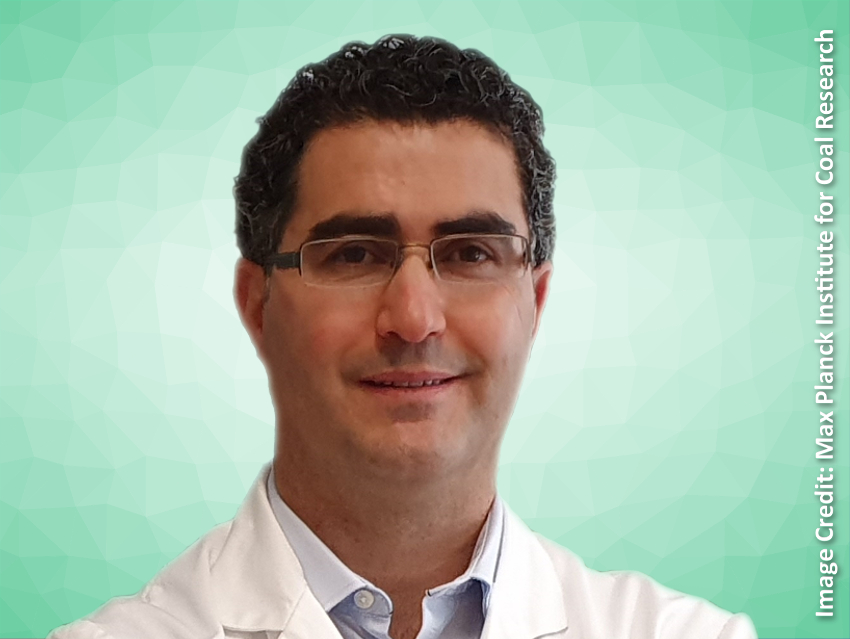PD Dr. Harun Tüysüz, Research Group Leader at the Max Planck Institute for Coal Research, Mülheim an der Ruhr, Germany, has been awarded the DECHEMA Prize 2019. He receives the award in recognition of his outstanding research on the development of catalysts that can be used for chemical syntheses and energy conversion. The prize is endowed with EUR 20,000 and is awarded annually for outstanding research work in the fields of technical chemistry, process engineering, biotechnology, or reactor engineering. This year, the award ceremony took place during a special online event.
Tüysüz’s research focuses on the design and development of nano- and mesostructured materials for catalysis, in particular, for applications related to sustainable energy. He is interested in reactions such as water splitting and the catalytic conversion of CO or CO2, as well as in the design of nanostructured halide perovskites and the investigation of their catalytic properties.
Harun Tüysüz studied chemistry at the University of Akdeniz and the Gebze Institute of Technology (GIT), both Turkey. He received his Ph.D. from the Max Planck Institute for Coal Research in 2008 under the supervision of Ferdi Schüth. He then served as a Postdoctoral Researcher at the University of California, Berkeley, USA, with Peidong Yang. In 2012, Tüysüz returned to the Max Planck Institute for Coal Research as Leader of the group of Heterogeneous Catalysis and Sustainable Energy. He completed his habilitation at the Ruhr University of Bochum, Germany, in 2016.
Among other honors, Tüysüz received the Jochen Block Prize from the German Catalysis Society (GeCatS) for his work in catalysis research in 2016 and a research grant from the Volkswagen Foundation in 2019 as part of the funding initiative “Life? – A Fresh Scientific Approach to the Basic Principles of Life“.
Selected Publications
- Cl2 Adsorption and Desorption over Ordered Mesoporous Carbon Materials as an Indicator for Catalytic Phosgene Formation,
Alexander Bähr, Jelka Diedenhoven, Harun Tüysüz,
Chem. Ing. Tech. 2020.
https://doi.org/10.1002/cite.202000040 - Nanocast Mixed Ni–Co–Mn Oxides with Controlled Surface and Pore Structure for Electrochemical Oxygen Evolution Reaction,
Tatiana Priamushko, Rémy Guillet-Nicolas, Mingquan Yu, Matthew Doyle, Claudia Weidenthaler, Harun Tüysüz, Freddy Kleitz,
ACS Appl. Energy Mater. 2020, 3, 5597–5609.
https://doi.org/10.1021/acsaem.0c00544 - Coulometric Titration of Active Sites at Mesostructured Cobalt Oxide Spinel by Surface Interrogation Mode of Scanning Electrochemical Microscopy,
Julian Lorenz, Mingquan Yu, Harun Tüysüz, Corinna Harms, Alexander Dyck, Gunther Wittstock,
J. Phys. Chem. C 2020, 124, 7737–7748.
https://doi.org/10.1021/acs.jpcc.9b11114 - Hollow Nano- and Microstructures as Catalysts,
Gonzalo Prieto, Harun Tüysüz, Nicolas Duyckaerts, Johannes Knossalla, Guang-Hui Wang, Ferdi Schüth,
Chem. Rev. 2016, 116, 14056–14119.
https://doi.org/10.1021/acs.chemrev.6b00374 - Cobalt-Oxide-Based Materials as Water Oxidation Catalyst: Recent Progress and Challenges,
Xiaohui Deng, Harun Tüysüz,
ACS Catal. 2014, 4, 3701–3714.
https://doi.org/10.1021/cs500713d - Mesoporous Co3O4 as an electrocatalyst for water oxidation,
Harun Tüysüz, Yun Jeong Hwang, Sher Bahader Khan, Abdullah Mohamed Asiri, Peidong Yang,
Nano Res. 2012, 6, 47–54.
https://doi.org/10.1007/s12274-012-0280-8
Also of Interest
- Event: DECHEMA Prize 2019 (Online)
Award ceremony and lectures - Interview: Harun Tüysüz,
ChemCatChem 2020, 12, 3832.
https://doi.org/10.1002/cctc.202000482




